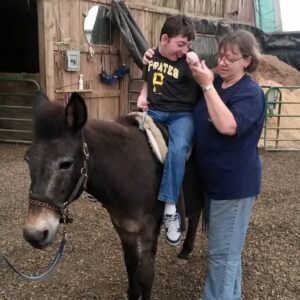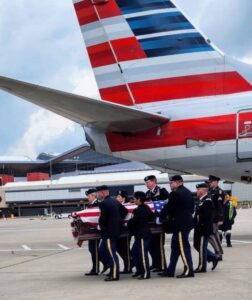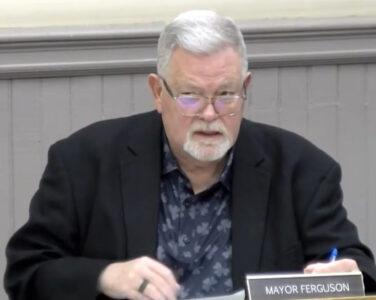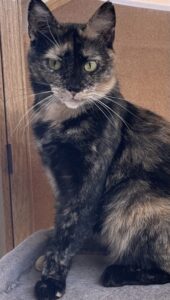Finding A Meaningful Connection At Home
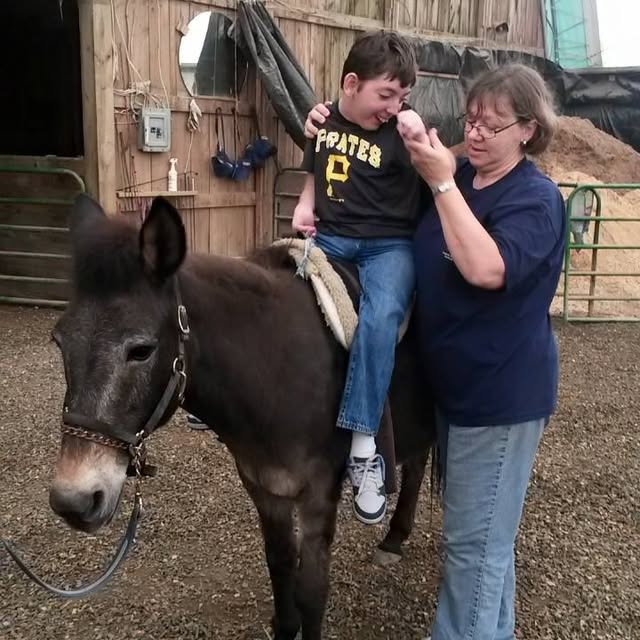
Anthony Senske is shown on Rosie. Residents can support the Anthony Senske Memorial Endowment Fund at the Community Foundation Cornhole Tournament and Raffle this weekend.
Westfield is a beautiful place, rich with potential. But like so many communities, it faces a troubling question: Why do so many of our young people leave as soon as they can?
Are we truly preparing them for life outside our village?
In a world flooded with noise, disconnection, and virtual reality, mental health is more fragile than ever. Not just for our youth, but for adults too. We’re drowning in information but starving for meaningful connection. The pillars that once grounded us in reality — nature, family, community — are fading behind screens, fantasy, and fear.
Without shielding our kids from the world, we need to return to reality and learn how to face it — with resilience, confidence, creativity, courage and most of all, compassion.
We’re more dependent on technology than ever before. And yes — it’s incredible. But what happens when that technology becomes unaffordable or inaccessible?
What happens when internet costs skyrocket? Or when AI is only available to those who can pay for it?
There was a time when only the wealthy could afford college. Are we heading toward a future where only the wealthy can access the tools of tomorrow?
If the grid crashes — what remains?
As a Baby Boomer, I grew up believing in the American Dream. We worked hard, applied for scholarships, and rose above economic obstacles. But what happens when even hard work isn’t enough because artificial intelligence (AI) has rigged the playing field? Will we all be pawns to Big Brother?
It is being said that AI will not replace jobs. People who know how to use AI will replace those who do not.
Technology has reshaped the way young people learn, connect, and even see themselves. Too many are disconnected from the value of education.
Why bother, they ask, when Google has all the answers?
So, the real question becomes: How do we make our children care about the core values of education?
A few years ago, Centaur Stride dreamed big. We submitted a grant proposal for a program called CHIP, (Community Horsepower Initiative Project). While the grant wasn’t awarded, the dream didn’t die. It lives on in the hearts of those who believe in the power of nature, community, and growing through connection.
This wasn’t just another program. It was a movement — a call to action that brought together youth, families, educators, and neighbors in a shared mission: To awaken what’s gone dormant.
With nature as our guide and horses as our partners, and including at-risk youth and children with disabilities, integrated with peers looking for purpose, and a community focused on building a strong foundation — mentally, emotionally, socially, and physically, the goal was to connect our horses and programs with others to make a greater difference in the future of all our children’s lives.
Let’s be honest — in today’s world, who isn’t at risk for mental health collapse and apathy?
Horses are powerful, intuitive animals. They are the link, the magnet, the magic.
Through working with horses, kids gain more than skills — they gain insight. They build empathy & emotional regulation, accountability & self-awareness, problem-solving & leadership, trust, communication & teamwork, and maybe most important of all, a sense of belonging.
One of the most exciting parts of CHIP was its deep connection to education. The pilot was designed as a 6-week summer program for students in grades seven to 12, especially those required to attend summer school. It was something different, unique, real. An experience they couldn’t get unless they showed up. It was something that ignited curiosity, adventure, and the feel-good motivation that comes from connection, physical exercise and accomplishments.
The goal? To help students take ownership of their journey, empowered, not forced. To return by choice, not obligation. CHIP wasn’t just a link to education; it was a bridge to transformation.
Additional components like student-led volunteer projects and entrepreneurship tracks gave students the chance to lead, contribute, and invest in their own neighborhoods. Their roots had the opportunity to grow deeper, anchoring them to something that mattered to them.
Today, thanks to Centaur Stride’s partnership with BOCES as a Co-Ser provider, participating school districts can receive state reimbursement, making this program and others more accessible and affordable.
Programs like this ignite a spark — through hands-on connection. In a world that often encourages apathy, this is a place where hearts and minds can reawaken.
If it truly takes a village to raise a child, then let’s build one rooted in compassion, courage, and collaboration. Let’s give our youth something to stay for — not something to escape from. Let’s help them belong, not just survive. Let’s raise them to rise — not just for themselves, but for all of us. And when they’re ready to spread their wings, let them fly — always knowing the way back home.
Who’s in?
For more info on Centaur Stride and our programs, contact us at info@centaurstride.org or linktr.ee/centaurstride.
Claudia Monroe is president and founder of Centaur Stride.

